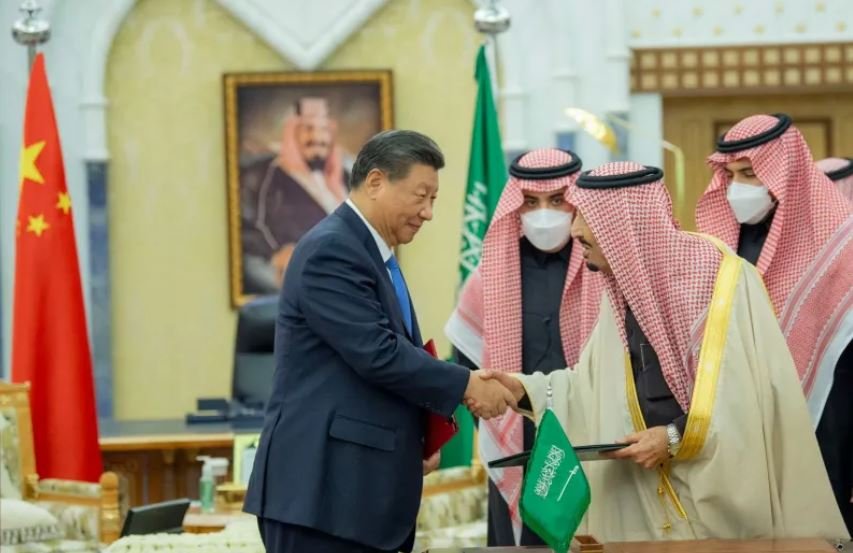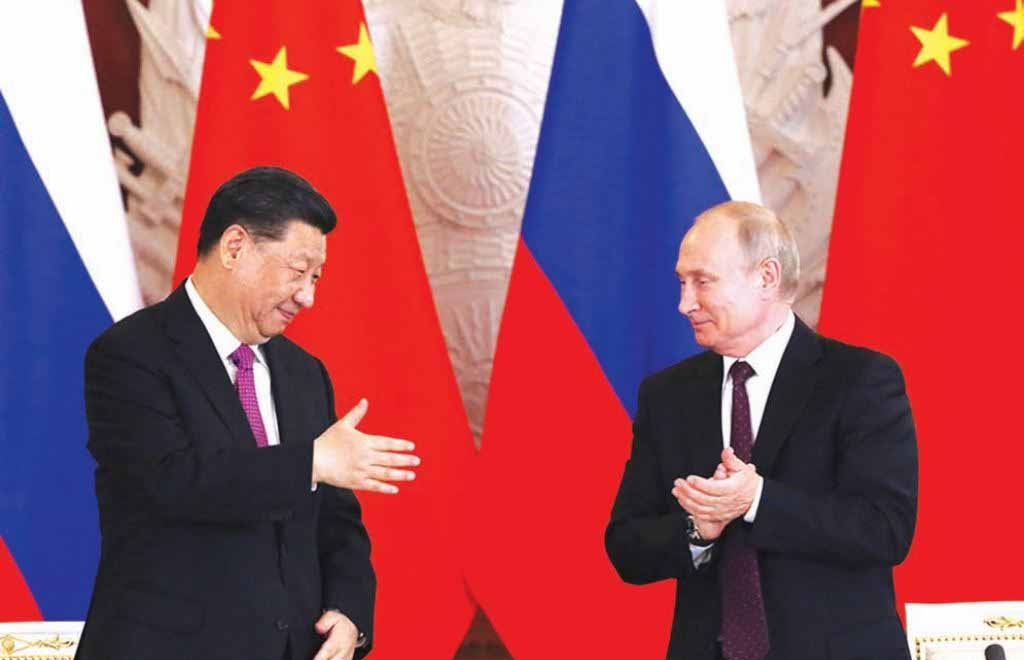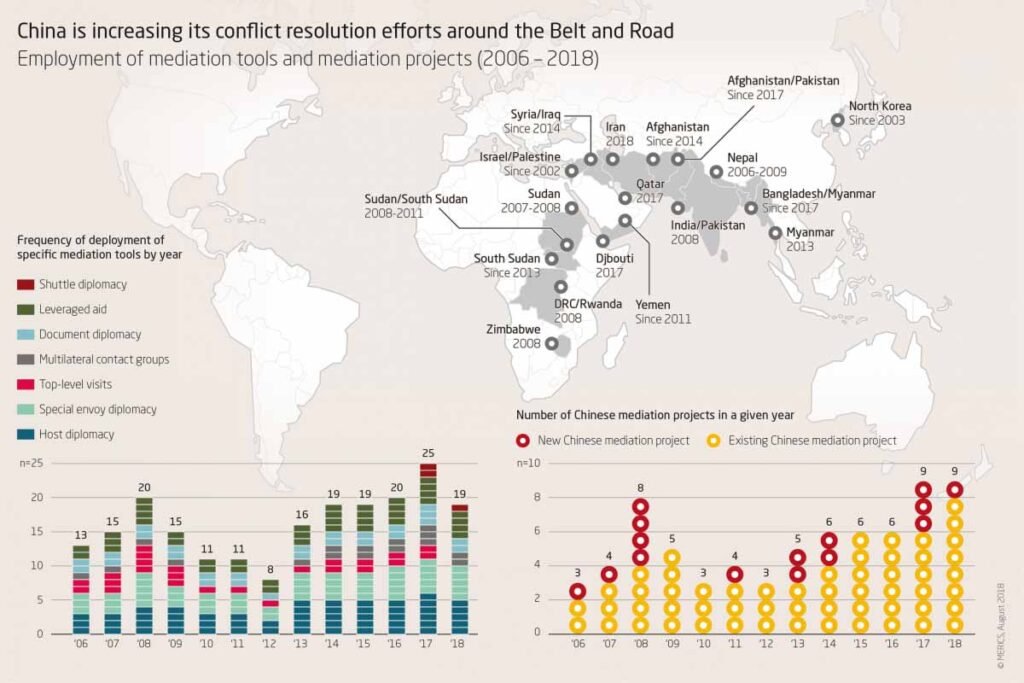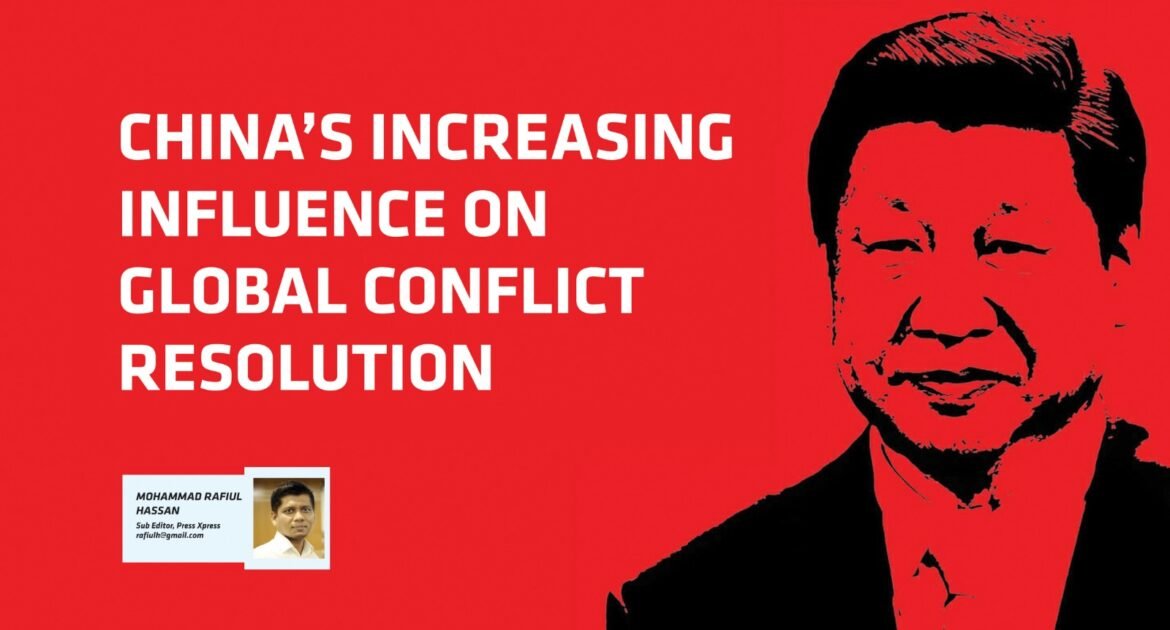The growing influence of China in global conflict management has become a significant topic of discussion in recent years. With its emergence as a major global economic and political power over the last few decades, China has been increasingly involved in maintaining international peace and stability. However, China’s approach to peace and stability differs significantly from that of the Western powers. MOHAMMAD RAFIUL HASSAN offers a comprehensive analysis of the factors that drive China’s actions and the potential implications of China’s approach to conflict resolution.
Over the past few decades, China’s rise as a global superpower has been undeniable. With its massive population, booming economy, and growing military capabilities, China has become an increasingly important player in international affairs. One area in which China’s influence has been particularly noticeable is in global conflict resolution.
In recent years, China has significantly increased its international mediation activities, with diplomats increasingly engaging in preventing, managing, or resolving conflicts in countries such as Saudi Arabia, Iran, Russia, Ukraine, Afghanistan, Bangladesh, Syria, and Israel, among others. This increase in Chinese mediation activities began in 2013, coinciding with the launch of the Belt and Road Initiative (BRI). Before that, Beijing had been relatively reluctant to engage in conflict resolution abroad.
Since the launch of the BRI, Beijing has paid more attention to its global mediation efforts and publicizes its activities more actively, both through top leadership statements and greater media coverage. The BRI has also shifted the focus of China’s mediation efforts to strategically important regions such as South Asia, the Middle East, Europe, and East Africa. Of late, China has played a key role in trying to resolve the ongoing conflict between Saudi Arabia and Iran, Russia and Ukraine. Chinese officials have also been involved in talks aimed at resolving conflict between North and South Korea, the Syrian civil war, Sudanese peace process, and the ongoing conflict in Afghanistan.
YOU CAN ALSO READ: WHY IS THE PALESTINIAN ISSUE AT THE TOP OF THE POLITICAL SCENE IN BRAZIL
China has been actively participating in peacekeeping endeavors by sending more troops to UN peacekeeping missions than any other permanent Security Council member. Additionally, China is financially supporting peacekeeping initiatives worldwide and promoting regional stability by strengthening ties with other Asian nations. It is now worth delving deeper into the factors motivating China’s actions and the potential implications for global peace and stability.

CHINA’S INVOLVEMENT IN CONFLICT ZONES? – WHAT DRIVES IT?
In recent years, China has been working to reconcile its traditional foreign policy pillars of non-interference and state sovereignty with the imperative of safeguarding its assets and citizens abroad, as well as responding to pressure from the global community to take a more proactive stance in preventing and managing conflicts. As part of this effort, China has been utilizing a range of tools, including shuttle diplomacy, peacekeeping initiatives, and development projects, to play an increasingly active role in crisis diplomacy, conflict mediation, UN peacekeeping missions, and post-conflict reconstruction in areas affected by conflict.
The main driver of China’s engagement in conflict and post-conflict settings is to secure natural resources and gain better market access, particularly along the Belt and Road Initiative (BRI) route. While other factors such as internal security concerns, geopolitics, and the protection of Chinese citizens abroad may also be influential in specific contexts, they tend to be secondary. In general, China’s main focus in regions characterized by instability and conflict is to advance its own economic development, connectivity, and trade objectives.
A “CHINESE SOLUTION” TO CONFLICT
China has a distinct perspective on addressing violent conflicts and security challenges that diverges significantly from that of Western countries. While not explicitly outlined in any official policy document, China’s engagement in conflict zones is underpinned by a set of “Chinese solutions” and approaches. Instead of pursuing peace, China prioritizes stability, particularly in regions where it has significant financial and geostrategic stakes. Drawing from its domestic experiences, China regards efforts to promote good governance and human rights as premature or even detrimental to the goal of achieving stability. In China’s view, a strong state authority is essential for maintaining stability.
Unlike the “liberal peace” theories advanced by Western countries that prioritize good governance and the protection of political rights, China’s “developmental peace” concept emphasizes the significance of economic development as the key prerequisite for achieving lasting internal peace. In this framework, civil and political rights are viewed as a potential outcome of economic growth and stability, rather than a means of promoting them.
China advocates for local solutions to local conflicts and supports the role of regional organizations in promoting peace, as demonstrated by its backing of the mediation efforts of the Intergovernmental Authority on Development (IGAD) in South Sudan. China believes that those directly affected by conflicts have the primary responsibility for resolving them, with outside forces playing only a supporting role. However, while promoting indigenous ownership of peace initiatives and local solutions, China also seeks to enhance its own discourse power. Compared with other major external powers, China has significant advantages in conflict management. First, unlike Western powers or Russia, China has not left any bitter taste in regions associated with colonialism, religious or historical engagement. Secondly, China has been careful not to take clear-cut sides in regional conflicts, making itself an ideal candidate to act as an honest broker. However, despite these advantages, many views Chinese conflict management in regions has remained considerably modest and lacked any practical solutions to critical problems.
CHINA’S APPROACH TO CONFLICT RESOLUTION IN THE MIDDLE EAST
China’s foreign policy toward the Middle East has traditionally been driven by its national interests, particularly energy security, arms exports, and technology transfers. However, in recent years, China has also expanded its diplomatic contacts and promoted cultural ties with the region. More importantly, China has increasingly engaged in conflict management in the Middle East, despite its stated commitment to non-intervention in other countries’ domestic affairs.

China’s growing involvement in conflict management is evident in its deepening footprint in the region. China has moved from leaving the burden of conflict management to other extra-regional powers to playing a notable role in some of the peace efforts. For instance, China has played a significant role in managing the Syrian and Yemeni crises, the Sudanese negotiation process, and the recent Iran and Saudi Arabia’s rapprochement.
The recent agreement between Iran and Saudi Arabia to restore diplomatic and economic ties is part of a larger shift in the geopolitical landscape of the Gulf region that has been unfolding since January 2021. China’s move from the sidelines to the center stage has been a long time in the making, with the 2019 drone strikes on Saudi Aramco facilities serving as a warning that tensions between Tehran and Riyadh could threaten China’s vital interests, including energy security. However, this is just one aspect of a larger picture in which China’s growing political, financial, and economic exposure has reached a turning point where it can no longer rely solely on free-riding to safeguard its interests. Consequently, China has taken on a greater role and responsibility as a direct mediator, leading to the successful conclusion of the détente between Iran and Saudi Arabia. While former Foreign Minister and current Politburo member Wang Yi played a direct role in mediating the agreement, other players such as former Iraqi Prime Minister Mustafa Al Kadhimi were also involved as facilitators, underscoring the importance of China’s involvement. Overall, mediating between Iran and Saudi Arabia aligns with China’s broader strategy and interests in the Persian Gulf region.
DIPLOMACY IN RUSSIA, UKRAINE: OPPORTUNITIES AND AND RISKS
Following China’s success in the Middle East, Chinese leader Xi Jinping is now taking a more active role in mediating the Russo-Ukrainian war. The war has presented both opportunities and risks for China, and it remains to be seen how it will affect China’s position in international relations.
One opportunity for China is the partial weakening of Russia as a result of the war and Western sanctions, which could make Russia more dependent on China and eastern markets. This could enable Beijing to expand its presence in the Russian market in key industrial and economic sectors and bind Russia as a “resource asset.” Additionally, the war has provided valuable information to China on U.S. and EU response mechanisms, which could be vital in determining how China might respond in the event of a massive confrontation with the West, for example over Taiwan.
Furthermore, Xi’s involvement in the Russia-Ukraine war could entrench China’s position as the leader of the anti-U.S. bloc, maintain Moscow’s pro-Beijing tilt, and improve China’s standing in the developing world. A considerable segment of the global community is receptive to alternative approaches to the current rules-based international system and is likely to welcome China’s expanding diplomatic influence.
However, there are real risks associated with China’s involvement in the conflict. Xi may overplay his hand in negotiations and associate himself too closely with Putin, further damaging perceptions of China across Europe, especially eastern Europe. This could ultimately draw Moscow and other anti-Western states into Beijing’s orbit while pushing Europe further away.
Moreover, while Xi’s increasingly contentious relationship with democracies will constrain his ability to secure political gains in Europe, he may secure important wins for Chinese economic interests if fighting in Ukraine is sharply reduced. De-escalation could stabilize the economies of Ukraine, Russia, and the EU, lower world commodity prices, and support Chinese exports. Finally, the conflict would push China has to become more active to extend its reach in Oceania, Central Asia, and South Asia, whereas the US and the EU are constrained by their hardline stance on Russia and internal socio-economic challenges.

CHINA’S BALANCING ACT IN RUSSIA-UKRAINE CONFLICT
Experts say China’s stance on the Russia-Ukraine conflict is primarily motivated by its own strategic competition with the United States, rather than any concern for Ukraine’s future. While China does not want to see a prolonged conflict that could bring political, reputational, and economic risks, it also does not want to see Russia suffer a total defeat that could create a new geopolitical environment unfavourable to China’s interests. China sees Russia as a situational partner in its global competition with the United States, but not a vital player in its economic and technological future, which lies with the European markets.
China’s foreign policy is focused on promoting a more representative multipolar world order in which the United States would lose its global dominance. Therefore, China has portrayed itself as a neutral party in the war since its beginning, blaming the US for the situation while calling for peace. However, it has refrained from condemning Russia and even amplified its propaganda through Chinese media. Despite this, China has not provided any tangible support to Russia or aided in circumventing sanctions. Furthermore, it has not enabled an alternative to SWIFT for Russia’s Central Bank.
As the conflict in Ukraine persists, China’s balancing act will become increasingly challenging. The international community has called on China to mediate a cessation of hostilities, given its history of crisis diplomacy and mediation. While it is unlikely that China will take on this role, it should not be disregarded as a potential player in managing the geopolitical conflict. Particularly if an international framework for negotiations and commitments is established through a United Nations Security Council resolution, statement, or other parallel mechanisms. If and when a settlement is reached, it may be in China’s interest to use its influence to facilitate a geopolitical agreement with Russia.

CHINA PRIORITIZES PROMINENT, MULTINATIONAL MEDIATION EFFORTS IN BRI NATIONS
China’s conflict mediation efforts have become more ambitious, as demonstrated by its involvement in nine high-profile conflicts in 2017, including the civil war in Syria, the Israel-Palestine conflict, and the Rohingya crisis. Most of these conflicts are located along the Belt and Road, indicating that China’s conflict mediation activities are driven by its economic interests. However, Beijing’s involvement in multinational initiatives allows it to present itself as a responsible global actor, while evading full responsibility if its efforts fail.
In many cases, China is not the only party involved in the mediation process, and it often relies on high-profile mediation tools that target the top levels of governments. While this approach provides Beijing with media attention and direct access to local governments, it has so far proved ineffective in producing a long-term sustainable peace process in any of the conflicts it is involved in.
In conclusion, China’s approach towards peace differs significantly from that of the West. For now, China’s international mediation efforts tend to focus on conflict management and stability preservation rather than long-term conflict resolution. Nevertheless, as a major global player and driver of growth, China is likely to become more involved in countries where peace is fragile in the context of a changing world order. Therefore, there is a need for the West and China to seek common ground for cooperation in peacemaking and peacebuilding efforts that will help to safeguard the interests of both, as well as those of people affected by conflict and fragility around the world. Such cooperation could involve sharing expertise and resources, engaging in joint efforts to address the root causes of conflicts, and finding ways to reconcile differences in approaches towards peace. Ultimately, cooperation between the West and China in promoting peace and stability will be crucial in addressing the many complex challenges facing the world today.


